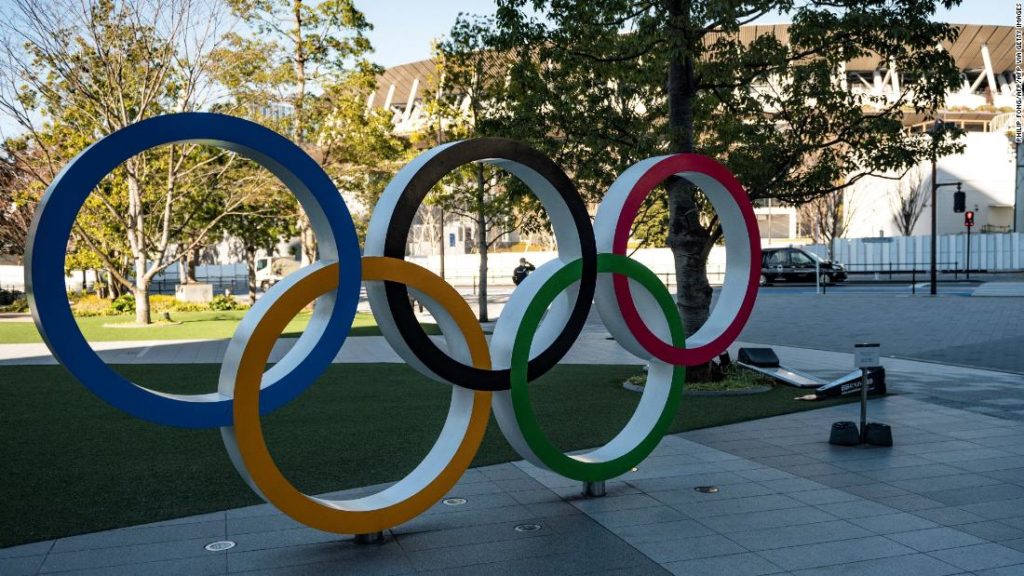The Olympic torch relay, already impacted by the pandemic, continues its journey across Japan, and four test events for volleyball, diving, the marathon and athletics were staged at the start of May.
More than 11,000 athletes from 207 different National Olympic Committees (NOCs) took part in the 2016 Rio Olympics, and more than 7,800 athletes have already secured a spot to compete in Tokyo.
Vaccine rollout may have increased, but gathering the world’s best athletes for the globe’s biggest sporting event will prove a huge logistical challenge.
What are some of the plans in place?
Given the strict health and safety measures being implemented, this Olympics will undoubtedly look different to any seen before.
Among these are detailed procedures around testing, including all participants being given two Covid-19 tests before entering Japan and athletes and those in close proximity being tested every day after their arrival.
If an athlete returns a positive test, they will have to isolate and will not be allowed to compete, but a further test will be conducted from the same sample if the first test is positive or unclear.
Participants will also have to download two apps for health reporting and contact tracing while in Japan, and athletes will receive a Samsung smartphone upon arrival at the Olympic and Paralympic village to help log health details.
Athletes and officials have been told to wear a mask at all times — except when eating, drinking, sleeping, training or competing, according to the playbook — and have been advised to keep physical interaction to a minimum.
Unless necessary, athletes have been told to use dedicated Games vehicles — rather than public transport — for travel, and not to visit tourist areas, shops, restaurants, bars or gyms. All their meals must be eaten in designated areas.
Athletes are also under instructions to leave Japan within 48 hours after they have finished competing.
A final version of the playbook, given a clearer sense of what form the Games might take, is expected in June.
Will vaccines be required?
Vaccines are being seen as part of the “toolbox” of countermeasures during the Olympics, and the International Olympic Committee (IOC) says it is working with countries to encourage and assist all athletes, officials and stakeholders to be vaccinated.
However, a vaccine will not be required to participate in the Games.
The cost of canceling the Games
Organizers have been quick to quash reports in recent months that the Games are set to be canceled, remaining adamant that they will go ahead as planned.
Japanese Prime Minister Yoshihide Suga has said that decision around canceling the Games rests with the IOC, rather than Japan’s government or the local organizing committee.
The IOC is a non-profit organization and distributes around $3.4 million every day to support athletes and sporting organizations around the world.
Close to 75% of the IOC’s funding comes from broadcasting rights, meaning the Tokyo Games would generate much-needed revenue, even without fans in attendance, while a cancellation would prove disastrously costly.
The Games have been canceled only on three previous occasions — in 1916, 1940 and 1944 — all because of world wars.
Public opposition
Among the Japanese public, there is a strong feeling that the Games shouldn’t go ahead.
An anti-Olympics petition has gained over 350,000 signatures, while protestors have also taken to the streets to demonstrate against the Games going ahead.
More recently, an IOC press conference on May 12 was interrupted by a protestor shouting “no Olympics anywhere” and holding a banner that read “no Olympics in Tokyo.”
The IOC, however, remains unfazed by opposition from the public.
“When the Games happen and the Japanese people are proud hosts of an event that will be a historic moment, I think I am very confident we will see public opinion hugely in favor of the Games.”
You may also like
-
Afghanistan: Civilian casualties hit record high amid US withdrawal, UN says
-
How Taiwan is trying to defend against a cyber ‘World War III’
-
Pandemic travel news this week: Quarantine escapes and airplane disguises
-
Why would anyone trust Brexit Britain again?
-
Black fungus: A second crisis is killing survivors of India’s worst Covid wave

